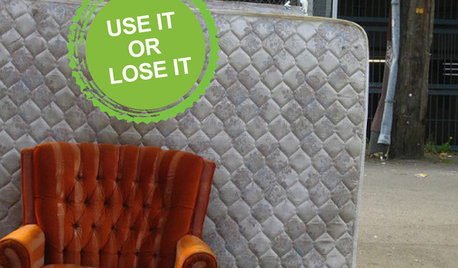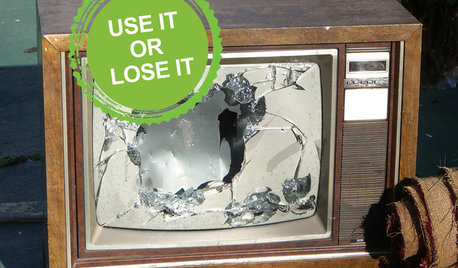Getting rid of bees
highcotton_2008
15 years ago
Related Stories

MOST POPULARHow to Get Rid of Those Pesky Summer Fruit Flies
Learn what fruit flies are, how to prevent them and how to get rid of them in your home
Full Story
GARDENING AND LANDSCAPING4 Good Ways to Get Rid of Mosquitos in Your Yard
Stay safe from West Nile virus and put an end to irksome itches with these tools and methods for a porch, patio or yard
Full Story
EDIBLE GARDENSNatural Ways to Get Rid of Weeds in Your Garden
Use these techniques to help prevent the spread of weeds and to learn about your soil
Full Story
DECORATING GUIDESLose It: How to Get Rid of Old Light Bulbs
When the light goes out, you'll want to get rid of the bulb safely. Here's how
Full Story
DECORATING GUIDESUse It or Lose It: How to Get Rid of Old Keys
Clean out your junk drawer by getting rid of keys in an earth-friendly way
Full Story
DECLUTTERINGDownsizing Help: How to Get Rid of Your Extra Stuff
Sell, consign, donate? We walk you through the options so you can sail through scaling down
Full Story
DECORATING GUIDESLose It: 4 Ways to Get Rid of Your Old Carpet
Try one of these earth-friendly tips before stuffing your dingy carpet or rug in the trash
Full Story
DECORATING GUIDESLose It: How to Get Rid of a Mattress
Updating your bedroom? Here's how to donate, reuse or recycle that mattress — and keep it out of the landfill
Full Story
MORE ROOMSHome Tech: Getting Rid of Wires Without Sacrificing Sound
Wireless home technology still isn't perfect, but new products are giving audiophiles choices
Full Story
DECORATING GUIDESCleaning Out: The Right Way to Get Rid of Electronics
Learn how to dispose of worn-out electronics in a safer, more Earth-friendly way
Full Story





txbeeguy
highcotton_2008Original Author
Related Professionals
Birmingham Landscape Architects & Landscape Designers · Forest Park Landscape Architects & Landscape Designers · Prairie Ridge Landscape Architects & Landscape Designers · Broadlands Landscape Contractors · Camp Verde Landscape Contractors · Fort Wayne Landscape Contractors · La Mirada Landscape Contractors · Norwalk Landscape Contractors · Pompton Lakes Landscape Contractors · Ringwood Landscape Contractors · Rosemount Landscape Contractors · San Carlos Park Landscape Contractors · Snoqualmie Landscape Contractors · Tyngsboro Landscape Contractors · Four Corners Landscape Contractorspls8xx
bandit_tx
jmonette1
buzzbee